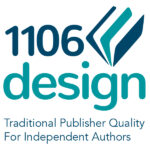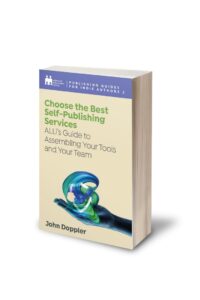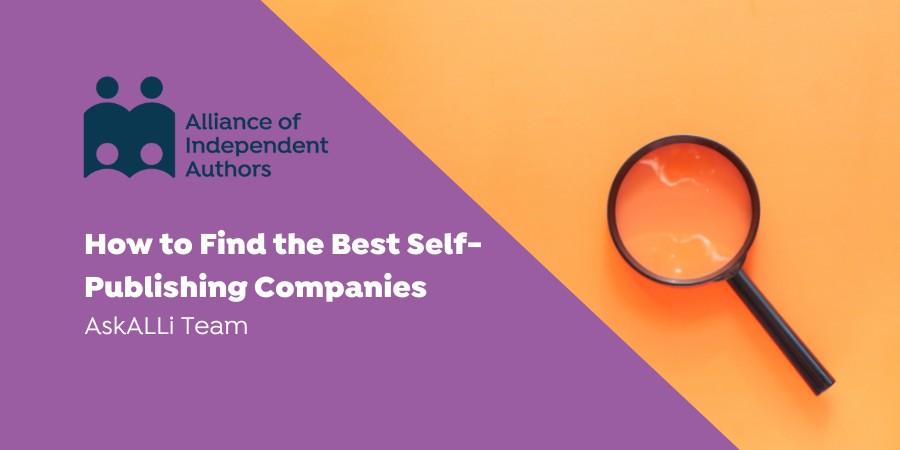Completing a book is a huge achievement. But approaching the next stage can be overwhelming, especially if you don't really know how to find the best self-publishing companies. Today, Alliance of Independent Authors partner member 1106 Design is here to explain the ins and outs, as well as some handy tips from one of our self-publishing guides.

Michele DeFilippo, CEO 1106 Designs
Michele DeFilippo has worked in the publishing industry for 50 years. For the past 21 years, her company, 1106 Design, has helped independent authors bring top-quality books to market without taking a cent of their revenue from sales. POD printing and distribution are arranged in the author’s name, so they never lose control of their book. Check us out at 1106design.com, on their Facebook or LinkedIn.
How to Find the Best Self-Publishing Companies
Before getting into the meat of this blog post, let’s clarify what “self-publishing” means and what “self-publishing companies” are.
To publish means to “bring printed works before the public, usually for sale.” (Merriam-Webster). Therefore, to self-publish means to bring your own work before the public and to do so at your own expense, without the involvement of an established publisher. In true self-publishing, you have full control over the entirety of the project, from creation to pricing and distribution.
Now that you understand what it means to self-publish, let’s examine what self-publishing companies are. When you hear the term “self-publishing company,” you may be thinking of a company that helps authors self-publish their work by managing the complexities of production, or even a company that helps authors “self-publish” their work by both producing and publishing the work. While these are widely accepted definitions for the term “self-publishing company,” these are actually different types of “publishing services companies.” Hybrid publishers can fit into this category, as they straddle the line between traditional publishing and assisted self-publishing services. The methods differ from company to company, but they all charge the author to offset the cost of production.
A self-publishing company is more accurately a company that facilitates the self-publishing process. IngramSpark and Amazon Kindle Direct Publishing (KDP) are companies that provide indie-authors with an access point to sell their books to the public. The “self” part comes in when the author uploads the files to either one of these platforms for “publication” and distribution to online retailers such as Amazon and Barnes & Noble and to make the book available for ordering by libraries and brick-and-mortar stores.
As far as which is best–IngramSpark or KDP–that depends on author preference, as they both can be considered “best.” In this blog post, I explore the difference between IngramSpark and Amazon KDP to help you make an informed decision on which is right for you.
What are my self-publishing options?
Now that you understand the terms “self-publishing company” and “publishing services company,” you should know what options you have to self-publish your work.
- Do it all yourself, with or without the assistance of templates and freelance professionals.
Depending on what freelancers you hire to help you with design, editing, and other necessary stages of the publishing process, this is a lower-budget option. With it, you maintain editorial and design control over the project, and you keep 100% of your royalties.
On the downside, this option is especially time-consuming. If you don't hire qualified professionals, it can produce substandard results. Fixing the problems in manuscripts handled in such a way can be costly and result in lost sales.
- Contract with a publishing services company that does the production work necessary to publish a book, namely editing and book design.
As with the previous option, you maintain editorial and design control, only you do so with assistance from a team of professional designers and editors. You keep 100% of your royalties. If the company is legit, this option provides a professional product that competes with the bestsellers in your genre.
An important con to consider is higher upfront costs. You should also watch out for companies that provide cheaper services in return for a portion of your royalties, and read reviews to judge the quality of companies’ work.
- Hire a company to handle all the production work and publish your book.
While it can seem like less work for the author and many companies do nice work, this option can be very expensive and may even result in fewer royalties to you if the publishing is seamless. Keep in mind that, despite what some companies claim, only KDP and IngramSpark do print-on-demand; the company is just the middleman, a service the author pays for.
It’s very important to remember that if the company provides the ISBN, they are the publisher of record, not you. It can be difficult to get application files from the company if changes are needed to the book. Beware of scams, and pay attention to whether the company retains any rights to your work.
How do I choose?
 If you’re intimidated by the thought of taking on too much work, the third option may be most appealing to you at first glance, but ask yourself this: If a publisher charges you to produce the book and charges you for marketing services, what entitles them to any portion of your profits?
If you’re intimidated by the thought of taking on too much work, the third option may be most appealing to you at first glance, but ask yourself this: If a publisher charges you to produce the book and charges you for marketing services, what entitles them to any portion of your profits?
Authors need to consider what the “company” is doing for them that they can't now do for themselves by hiring experts and managing their own print-on-demand. Managing a team of experts is a daunting task and fraught with risk if the author doesn't know anything about editing or design. However, that's where companies such as 1106 Design come in.
For example, 1106 Design offers the convenience of project management, the assurance of a vetted team that will do the job right, and coaching every step of the way. All the revenue from book sales goes directly to the author.
If you choose to hire a publishing services company or contract with a company that does everything including the publishing, how do you know which company to choose?
For starters, make sure you get quotes from any company that you approach to do the production and publication of your book. Aim for quotes from at least three different companies. If you’re still not sure whether to hire a publishing services company or a company that will do the production work and publish the book for you, get quotes from each. The best company is the one that caters most to your unique needs.
Here are some considerations you should make to help you wade through the information online, decipher and compare quotes, and ultimately decide on the best route for you and your book.
- Is the company asking you to apply and pay money for them to “publish” your book? This is a red flag, especially if they ask for an application fee.
- Has the company/freelancer provided you with a firm quote and clear terms and conditions?
- Does the quote detail each service that will be provided? Can they tell you what other costs to expect, such as the ISBN purchase, title set-up, printing costs, or marketing? Are there any hidden costs or additional costs down the line if certain events happen or don’t happen? One red flag regarding hidden costs is a company that provides you with a quote that is substantially less than the other quotes you have received. If something seems too good to be true, there’s likely a catch.
- What are the fixed and variable costs per book? Fixed costs are those that don’t change with the number of books you sell. They can include design and editing. Variable costs can be calculated per book. One example of a variable cost is printing. If the company includes publication (e.g., printing and distribution) of your book, have they been transparent with fixed and variable costs so that you can make an informed decision?
- What percentage of the book’s retail price will you receive as publisher compensation (sometimes called “profit” or “royalties”)? If the percentage is less than you would receive by self-publishing through Amazon KDP or IngramSpark, understand why and know what you are sacrificing.
- Are you within your budget? If one company’s quote exceeds your budget, what are you gaining for that additional expense, and is it worth the cost?
- Who owns the ISBN? If it’s not you or your business, know that you may never be able to publish your book via any other route in the future without spending time and money wrestling the book away from the original company. If the company is not transparent about the ownership of the ISBN, it’s time for you to move on or thoroughly understand what you are giving up. In the US, ISBNs may only be purchased from Bowker; in Canada, ISBNs are available from Library and Archives Canada for free. To find out who will own your ISBN, you can ask the company for the publisher name that will be printed on the book. You can also ask the company to point you to their own literature about the ISBN and how it is issued to you. Some warning signs may include phrases such as “ISBN assignment,” “we will give you a unique ISBN,” or “free ISBN.”
- Have you been provided with examples of covers and pages from actual books the company or freelancer has designed? How do their designs measure up with bestsellers in your genre? Do they fit in, or do they look amateurish in comparison?
- Does the company or freelancer receive positive customer reviews? Can you find any reviews on their website, Facebook page, or other site? Don’t forget to Google the company and see what people are saying about it. If there are no reviews, can they provide you with references?
- Will your book be accessible to book stores and libraries? IngramSpark is the only print-on-demand company that will distribute to and accept returns from book stores in return for a higher wholesale discount (i.e., fewer profits to you). Some companies will not distribute to book stores because doing so is not as profitable for them.
- Do you need help with book marketing? Know that it is not the same as distribution. Just because your book is available to book stores doesn’t mean it’s on their radar. Book marketing is really your job, regardless of the path you take. However, some companies and freelancers do offer marketing assistance or marketing consultations to help bolster your efforts. So, if this is important to you, take it into consideration when making your selection.

ALLi Watchdog, John Doppler.
ALLi's Watchdog John Doppler says:
“One must always be wary of predatory or unqualified companies operating under the guise of hybrid publishing. Legitimate hybrid publishers offer significant value for the fees charged, but disreputable vanity presses often masquerade as hybrid publishers in order to justify inflated fees and to mask their poor value. Authors should carefully consider what value is being offered for that money, and pool opinions from the indie author community to screen out substandard services.
ALLi's service ratings and Partner Directory spotlight excellent hybrid publishers who align with our Code of Standards, and offer value and services commensurate with the fees charged.”
About ALLi's Service Ratings
As part of its community outreach service, ALLi Service Ratings is provided openly and free of charge to all.
It is designed to separate reputable self-publishing services from the rogue operators who over-promise, overcharge, under-deliver, or in any way exploit authors. ALLi is willing to work with any service that wants to improve its offerings and bring them in line with our recommendations for current best practice for author services.
Contact the Watchdog Desk at any time if you would like to inform us about a service or discuss a rating.
Service providers are listed in alphabetical order for easy lookup and are assigned one of five possible ratings:
- Excellent (Partner Member) Services that have been carefully vetted and which align with ALLi’s Code of Standards.
- Recommended Services that behave ethically and professionally, with pricing and value in line with industry norms.
- Mixed Services that behave ethically and professionally, but fall short of ALLi’s Code of Standards in one or more areas.
- Caution Services that do not align with one or more aspects of the ALLi Code of Standards. These services should be avoided.
- Watchdog Advisory Services that have given rise to consistent complaints and which may have been subject to legal action.
The ratings provided in the link below are the opinions of the ALLi Watchdog Desk, based on careful appraisals of pricing and value, quality of service, contract rights, transparency, accountability, and customer satisfaction. To avoid driving traffic to substandard services, we do not generally give a website address for those rated as Caution or Watchdog Advisory.
For the most current information, see: SelfPublishingAdvice.org/ratings.
Contact the Watchdog Desk at any time if you would like to suggest a service for evaluation or share your experiences with a service provider. You can reach the desk at: [email protected]
How to Find the Best Self-Publishing Companies: Recovering From a Bad Service
But what happens if you are the victim of a choosing a bad service? That's what we answer in the next section.
 Authors: Want to know which self-publishing services are reputable, which to avoid, and which offer the best return on investment? Drawing on the experience of the Alliance of Independent Authors (ALLi)’s watchdog desk, this guide empowers you to choose the best self-publishing partners for your book and author business, from large players like Amazon KDP, Google and Apple Books down to your local friendly freelance.
Authors: Want to know which self-publishing services are reputable, which to avoid, and which offer the best return on investment? Drawing on the experience of the Alliance of Independent Authors (ALLi)’s watchdog desk, this guide empowers you to choose the best self-publishing partners for your book and author business, from large players like Amazon KDP, Google and Apple Books down to your local friendly freelance.
ALLi members can download a complimentary ebook copy of Choosing The Best Self-Publishing Service in the Member Zone. Navigate to allianceindependentauthors.org and log in. Then navigate to the following menu: BOOKS > GUIDEBOOKS. Other formats are available to members and non-members in ALLi’s Bookshop.
Every day, an author somewhere realizes that they've been defrauded by a vanity press. Or they come to the painful conclusion that their publisher is not living up to their obligations. Or their publisher collapses and the owners vanish into the night.
Despair is understandable. Sometimes thousands of dollars out of pocket, with their work in limbo or held hostage by an unscrupulous publisher, these authors may feel their literary ambitions have just ended.
Fortunately, that's not the case. Recovering from a failed publishing experience is not only possible, it's far easier than most suspect. And it's frequently an opportunity for authors to republish their book more professionally and profitably than before.
If a publisher or publishing service has failed you, know that you are not alone. It's virtually a rite of passage: countless authors have experienced it and have moved past that temporary setback into a thriving career.
Learn from the experience, and seize the exciting new opportunities that have just opened up.
Breaking Ties
Depending on the integrity of the publisher and the terms of the agreement you signed, ending a relationship with a publisher can be as simple as mailing a notice of termination, or it can be a nightmare of futility and frustration.
An author seeking to republish their work will be interested in these key steps:
- Reverting rights to their work. Find out more about rights reversion in our post here.
- Obtaining digital copies of the cover and the formatted, edited interior.
- Choosing a method for republishing the work.
- Ensuring that the former publisher is not profiting unfairly from the work.
One: Secure the Rights to Your Work
If your contract was non-exclusive or has expired, you are free to publish a new edition of your book.
If your contract was exclusive and the term of the contract has not yet expired, you are in a more difficult situation. You have several options for regaining control of your work, none of them ideal.
- You can ask the publisher or negotiate for early termination of the contract. This can be a painful option, one that requires the victim of a predatory publisher to swallow their anger and even make additional concessions, but it may be the most expedient way to reclaim your rights.
- You can wait out the term of the contract, if the contract expires after a specific period of time. Be sure to read the contract carefully and follow the procedure described in the termination clause, such as notifying the publisher in writing before any deadlines.
- You can notify the publisher that they are in breach of contract and that you are terminating the agreement. If the contract spells out the means of terminating the contract, this is usually a matter of notifying the publisher in writing and giving them a certain amount of time to correct any breach. But if the contract is not clear, or the publisher disputes that the contract has been terminated, you may have no means of enforcing that declaration without taking them to court. If the contract is unclear, this approach can be fraught with hazards. You must take into account a number of legal concerns which vary from jurisdiction to jurisdiction, so legal counsel is recommended.
- Finally, you can sue the publisher for breach of contract. This is the absolute last resort: legal action can be prohibitively expensive, time-consuming, and frustrating when trying to serve papers on an evasive or hostile defendant. Most authors choose to wait out the term of the contract rather than engage in a courtroom battle that will cost more than the book may earn over a lifetime.
Two: Gather Your Content
To republish, you will need—at the minimum—a professionally designed cover and a well-edited manuscript properly formatted for e-books and/or print.
With a cooperative publisher and a sound contract, this is simple enough: review your contract to verify what you are entitled to, and then request them in writing from the publisher. But if the publisher is unresponsive or unwilling, if your contract does not entitle you to these materials, or if the materials are not up to professional standards, you will need to obtain new ones from a service provider or your new publisher.
Be aware that formatting of manuscripts, interior design, and cover designs may be subject to ownership claims by the publisher. As unfair as it seems, even if the publisher has breached their contract or disappeared without a trace, you may not have a legal right to the materials they have created. You will need to consult your contract to determine which materials are unambiguously yours.
Three: Ensure That the Former Publisher is Not Profiting
You may wish to end the former company’s sales of your book, especially if the parting was hostile and they no longer have the rights to sell the book. This may be difficult to enforce. Retailers and distributors must halt those sales, something they will be reluctant to do without the consent of the original publisher or a court order forcing them to do so. No company wants to take sides in someone else's dispute.
Authors in the US and other jurisdictions that have formal copyright registration should file. Registration serves as strong, authoritative proof of ownership in the case of a dispute.
However, even if you stop sales of the previous edition, a listing will remain on Amazon to facilitate third-party sales of used copies. This does not necessarily mean that the publisher is actively selling or profiting from the work, as many sellers claim to have used copies they don't actually possess. (When an order comes in, these third-party sellers try to obtain a copy at wholesale prices, and if a copy cannot be obtained, they simply cancel the order.)
If it's not possible to halt the previous publisher's sales of the book, or the legacy sales page remains, it's still possible to overshadow it with the new edition. You can ask Amazon to link your new edition to the previous edition and to make the new edition the primary title. Your edition will then be the first that buyers see in search results, and the older edition will be buried under a tiny, all-but-invisible “See all formats and editions” link. Reviews and ratings from the earlier edition can be carried over to the new edition in this way, allowing you to relaunch with a significant head start in social proof.




